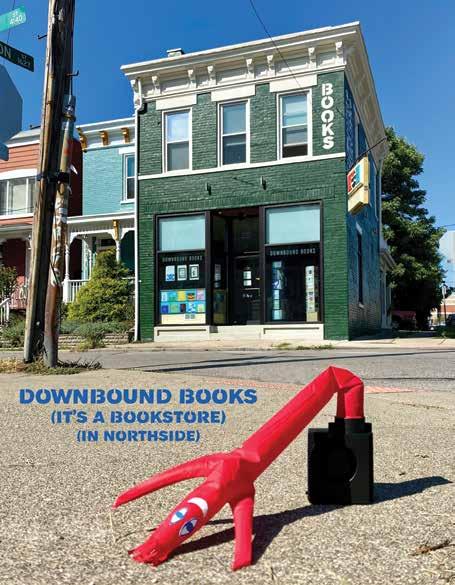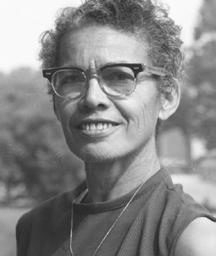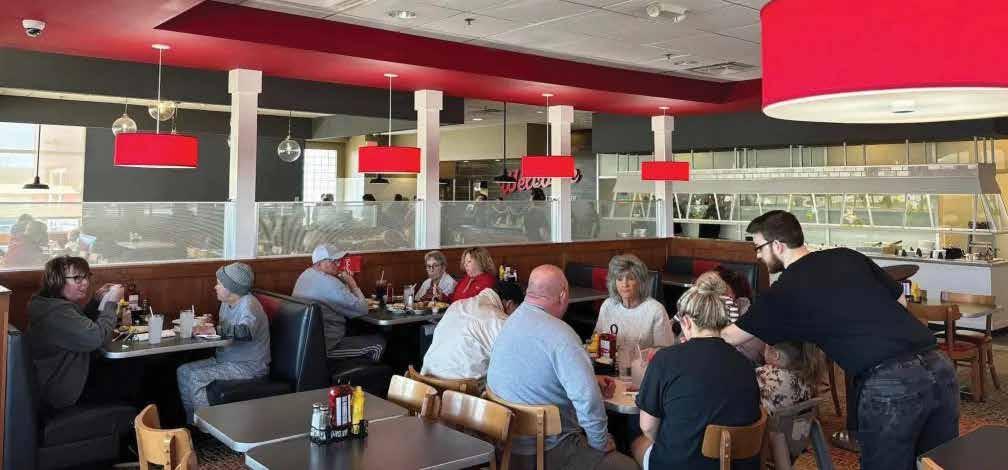

















The first woman to hold the position of chief in CPD’s history is making it clear she has no intention of leaving.
BY MADELINE FENING
The professional future of Cincinnati Police Chief Teresa Theetge is in limbo as city leaders look for an outside law firm to investigate her leadership. It was only two months ago that Mayor Aftab Pureval said he “absolutely” had confidence in Chief Theetge. Now his tune has changed as scrutiny from CPD’s union ramps up ahead of November’s election.
Public scrutiny of public safety efforts intensified in June when local gym owner Patrick Heringer was fatally stabbed following a break-in of his Over-the-Rhine home. Then there was the July Downtown brawl that quickly went viral, prompting fiery commentary about Cincinnati’s safety from far-right figureheads. In August, an innocent 31-year-old woman was caught in gunfire from a passing vehicle in Over-the-Rhine. Finally, the Oct. 13 double shooting at Fountain Square left several people injured and riled up local business leaders. On Oct. 15, Theetge was called back to Cincinnati from a conference
in Denver “to address departmental matters,” according to a statement from City Manager Sheryl Long. Pureval then told reporters that the city is “exploring all options” when asked if new police leadership was on the table. Ken Kober, president of Cincinnati’s Fraternal Order of Police, told CityBeat that Mayor Aftab Pureval asked Theetge to resign upon her return. She’s been with the department for over 30 years. In Cincinnati, the city manager is the only city leader with the authority to fire the police chief.
Days later, Theetge was placed on administrative leave pending an internal investigation into the “effectiveness of her leadership.” Theetge, who is the first woman to hold the position of chief in CPD’s history, made it clear she has no intention of leaving. She hired employment attorney Stephen Imm, who told reporters the city has no grounds for the decision.
“They’re looking for a scalp. They’re looking for a scapegoat,” Imm said during an Oct. 22 press conference.
“Terri Theetge deserves better than that. Cincinnati deserves better than that.”
Kober described the internal investigation as a “sham probe” meant to deflect blame for the “violent crime wave,” which he places on Mayor Pureval.
“Cincinnati is bleeding out because of Aftab Pureval’s failed leadership,” Kober said. “He pulls every string in this city like a puppet master, from stacking the courts with weak-kneed judges to micromanaging the police department and rendering the city manager a powerless yes-woman. Placing Chief Theetge on leave doesn’t solve a damn thing. It just spotlights Pureval’s inability to lead and his habit of hiding behind others when the heat turns up.”
City leaders confirmed on Oct. 23 they are now hiring their own outside attorney to conduct the internal investigation into Theetge’s leadership. That same day, the FOP announced it will drive a mobile billboard around City Hall and Downtown, encouraging residents to “back the chief and change Issue 5.”
The LED truck will feature a 6.5’ x
12’ billboard depicting Pureval as a “puppet master.”
“Mayor Pureval, the puppet master who really made this decision, wants to fire the chief to make her the scapegoat of his failed leadership and progressive politics,” Kober said. “If we want to fix the violence and long-term issues facing Cincinnati, city council needs to change Issue 5 and put the power to fire a chief in the hands of city council, not the city manager with influence from the mayor.”
Issue 5 was passed by voters following the 2001 police killing of Timothy Thomas. The charter amendment allows the city manager to hire and more easily fire the chiefs of police and fire.
“We all know the mayor would love to see his face on a bigger political stage one day,” Kober said. “While we can’t help with that, we hope he’s paying attention to his face and the message behind this billboard.”
Just how long Theetge will remain on paid leave is unclear. Adam Hennie, head of the Central Business Section, has been named interim chief in the meantime.
BY MADELINE FENING
Thousands of demonstrators turned out for the “No Kings” protest at Cincinnati’s Smale Riverfront Park Oct. 18, organized by 50501 Cincinnati.
The protest, which was one of thousands across the United States, took aim at perceived autocratic behavior from President Donald Trump, particularly his use of Immigration and Customs Enforcement agents (ICE) to carry out his mass deportation goals.
Timothy Snyder is a historian, author and professor at Yale University and the University of Toronto, and he also serves on the Committee on Conscience of the United States Holocaust Memorial Museum and is a member of the Council on Foreign Relations. Snyder was among the protest’s speakers, along with embattled Cincinnati imam Ayman Soliman and Planned Parenthood Southwest Ohio Region CEO Nan Whaley.
“A king is someone who tries to rule by way of violence and fear,” Snyder said. “Do you want the armed forces and our police to be the personal servants of a tyrant?”
Organizers estimate around 7 million people participated in around 2,500 protests across the country on Oct. 18. This number outweighs turnout for the first “No Kings” rally in June, which organizers estimate drew around 5 million nationally. In Cincinnati, the June “No Kings” protest drew an estimated 8,000 people to march through Clifton, but organizers estimate between 10-12,000 attended the October protest.
CityBeat used online mapping tools to

conservatively estimate around 10,000 people attended the Oct. 18 protest at Smale Park. Data from Strength In Numbers, partnered with independent Atlanta-based science newsroom The Xylom, contains upper estimates of 12,000 overall attendees. Overall, Strength In Numbers puts the upper estimate nationwide around 6.5 million, which would make it the largest single-day political protest in U.S. history.
Professor David Niven studies and teaches political science at the University of Cincinnati, specializing in elections. He told CityBeat that these numbers are even more telling when you consider the timing.
“It’s not election season; it’s not a typical political moment, but there’s a bubbling over of political disappointment and really human disappointment beyond politics,” he said. “The folks at these protests were not hyper-focused on city elections or, you know, whatever the next political event was. They just wanted to be seen and heard, and I think one of the most important things they do at these events is tell the rest of the nation, it’s not just you who thinks this is crazy.”
Stephen Finke told CityBeat there were “too many reasons” he showed up to Smale Park wearing a cardboard crown with the word “shame” carved out.
“I was looking for the most efficient
way, the easiest way, to express how I feel,” Finke said.
Trump expressed how he felt about the most recent “No Kings” protest with a post to his own Truth Social platform: an AIgenerated video of Trump flying a fighter jet over protesters, dumping what appears to be poop on the crowds, all while wearing a crown.
“The idea that Trump would tout his capacity to defecate on the nation, I think I can say with confidence, is without precedent,” Niven said. “That’s one of the defining moments and one of the defining aspects of Trump is to deny the humanity of anyone who disagrees or inconveniences him.”
BY KATHERINE BARRIER

Cincinnati Animal CARE (CAC), Hamilton County’s open-intake animal shelter, is asking the community for help to support a herd of neglected horses seized during a largescale cruelty case this summer.
Authorities seized the horses from Muddy Water Ranch in Springfield Township in August. Photos of the horses at the time showed signs of severe malnutrition and neglect, including sores, open wounds and visible ribs and hip bones. Owner Clarence Clemons, 68, was charged with 18 counts of animal cruelty. According to an affidavit, Clemons still used the horses for his trail riding business, even as they were suffering.
CAC says, due to repeated court delays, no court-ordered financial assistance has been issued to help care for the horses, who are now under the care of Fighting Chance Rescue and will be for at least
another month. Community donations following the horses’ seizure helped fund the initial expenses for feed, hay and medical treatment, but those have been depleted.
“This has truly been a labor of love for Fighting Chance,” Carolyn Evans, executive director of CAC, said in a press release.
“Their compassion and perseverance have kept these horses safe and healing for months, but they can’t do it alone. We’re asking the community to once again come together to support their care.”
Any donations will go toward feed, a farrier and veterinary care, as well as any other essential supplies to support the horses’ recovery.
Search “Cincinnati Animal CARE” on CityBeat.com to find a link to donate. CAC said donations can also be made by check. Please note “Horse Care Fund” in the memo and contact G.haskett@cincycare. org for instructions.


BY JIM DEBROSSE AND MADELINE FENING
Cory Bowman’s campaign to unseat Cincinnati Mayor Aftab Pureval in the Nov. 4 election will take a miracle of the kind Bowman claims are performed at his faith healing church in the West End.
“I think this is a nice sort of publicity stunt, but this is not a campaign for mayor,” said David Niven, a University of Cincinnati political science professor and long-time observer of Cincinnati politics. “I mean, this was a guy who didn’t even vote in city elections.”
But, as the first Republican challenger in 16 years to take on a Democratic incumbent in what is now a super-majority blue city, Bowman, in his own amateur way, is pointing out vulnerabilities among local Democrats in two areas — the city’s rising gun violence and the impact of big investors on Cincinnati’s
housing market.
Bowman, the 36-year-old half-brother of Vice President JD Vance, is the owner of Kings Arms Coffee shop and the evangelical pastor of The River Church, both in the West End. A native of Hamilton and a business graduate of Miami University with a ministerial degree from River University in Florida, Bowman moved to Cincinnati four years ago. He said his MAGA halfbrother inspired him to run for office, but has given him no advice or financial support.
Pureval hardly needs an introduction in Cincinnati, where he was one of the first Democrats to break up the Republican courthouse monopoly by running successfully for Hamilton County Clerk of Courts in 2015. A native of the Dayton suburb of Beavercreek and the son of Indian and Tibetan immigrants, the 43-year-old
Ohio State University and UC law school graduate is a former special assistant U.S. attorney and legal counsel for Procter & Gamble. After an unsuccessful run for Congress in 2018, he won the 2021 race for mayor with 66% of the vote.
The experience gap between the candidates shows in their campaign contributions. Bowman, who has no previous political experience, reported less than a fifth (18%) of the money raised by Pureval’s campaign ($33,000 vs. $185,000) in pre-election filings with the Hamilton County Board of Elections. Cincinnati residents accounted for 50 percent of Bowman’s donations and 60 percent of Pureval’s.
Bowman’s total pre-primary contributions of $10,000 included $100 from a donor who identified himself as a “professional gambler” and a

self-identified “stay-at-home dad” who donated $500. At least two small donations were anonymous, dropped in envelopes at his campaign headquarters.
Among Bowman’s biggest donors were members of the Bortz construction family. Neil, Christopher and Suzie Bortz each contributed the maximum of $1,100. Cincinnati Right to Life contributed a total of $675. In a tepid show of faith, the executive director of the grassroots group Republicans for a Greater Cincinnati donated $20 to Bowman’s pre-primary campaign, or less than half the cost of a Downtown parking ticket.
Pureval, as expected, drew large donations from members of Cincinnati’s biggest law firms, bluechip corporations, realtors, developers and university and physician groups in addition to numerous smaller donations, including those from ActBlue, the Democratic Party’s online fundraiser ($282). Some of his biggest individual contributions came from out-of-state donors, including LinkedIn co-founder Allen Blue ($1,100), Texas Signal President David Lee ($1,100) and Trowbridge Ventures developer Daniel Dickson ($1,100).
During an hour-long televised debate on Oct. 9, Pureval made clear his advantage in political experience and technocratic know-how, pointing out numerous times Bowman’s lack of knowledge on city issues and specifics in his policies.
But like a boxer on the ropes, Bowman managed
to land a couple of punches that went unanswered. After Pureval touted a $5.4 million crime-fighting package passed last month in response to a summer of high-profile crimes in Downtown and Over-theRhine, Bowman fired back that it was too little too late. “Last time I checked, he’s been in office ever since four years ago. So why is it just happening now? The problem with City Hall right now is we’re being reactive instead of proactive.”
Bowman noted in the debate that police were shorthanded Downtown on the night of the July 26 racial brawl, recorded parts of which went viral on social media and conservative news outlets. “The reason why that violence happened wasn’t because of the (Cincinnati) Music Festival. It wasn’t because of the race aspect. It happened because administratively you guys failed. The chief got on a press conference and said that there were 11 officers in the third shift, Central Business District. I looked at the (staffing) report and there were three officers and only two (police vans) that night. What that means is that you did not fully equip your city to be safe that night on one of the largest populated nights of our city.”
Pureval went on to endure backlash about the handling of the ongoing brawl investigation. After police had charged seven Black people in connection with the incident, the prosecutor’s office charged a 45-yearold white man — who is also listed as a victim in the incident — with slapping a Black man in the initial confrontation.
Cincinnati police viewed the filing of the misdemeanor charge as city administrators’ caving to political pressure from civil rights groups and community activists and undermining their own investigation into
the brawl.
“The city administration is eroding the very fabric of the justice system with orders to prosecute those without probable cause,” said Ken Kober, president of Cincinnati’s Fraternal Order of Police (FOP). “Cops are being used as political pawns. It’s disgusting.”
One week later, the police union voted unanimously for “no confidence” in Pureval and later endorsed Bowman for mayor.
Pureval called the vote “disappointing,” saying he has been “proud to stand with our officers at every turn as they make sacrifices to protect residents.”
Acknowledging the July 26 brawl in his debate against Bowman, Pureval admitted he should have been “more proactive in putting out a statement” on the incident, rather than waiting three days. “And my learning is that when these things happen and when they are nationalized by outside forces who are looking to divide Cincinnati, it’s important to treat it like a serious issue akin to an officer-involved shooting.”
A week after the debate, Pureval made a move to reclaim the narrative around public safety. On Oct. 15, Purval said the city is “exploring all options” when asked by reporters if new police leadership was on the table. Days later, Cincinnati Police Chief Teresa Theetge was placed on administrative leave pending an internal investigation into the “effectiveness of her leadership.”
Kober told CityBeat that replacing Theetge would be a mistake, suggesting instead that “residents vote for a new mayor.”
Theetge isn’t backing down. She’s since hired an employment lawyer, Steve Imm, who says the city is “looking for a scapegoat.”



Pureval himself has argued that crime data don’t back people’s fears of an unsafe city. Even so, he said during the debate that “what matters is what’s in the hearts and minds of Cincinnatians, and too many of them don’t feel safe, which is why this council has moved quickly to prioritize visibility. For the first time in a very long time, police officers are out of their squad cars and onto the street walking beats, interacting with the community, hearing from neighbors exactly what they’re scared of. For the first time in a very, very long time, we are actually enforcing the curfew. And it has been extraordinarily successful.”
Bowman, who doesn’t support removing Theetge as chief, countered Pureval’s claims of success with his personal experience in the West End. He said that gunfire was heard three times over the summer from his church on Clark Street. Nine days later, he posted on Facebook that, after he received online threats, someone had fired a shot through the window of his unoccupied church.
“As a pastor in the West End, as a business owner in the West End, and in our residence, we don’t see (increased crime) as a perception, we do see it as a reality,” he said during the debate. “These are things that we’re kind of seeing in the Downtown area, and we’re seeing it actually spread into other neighborhoods as well.”
Police data, however, don’t support Bowman’s claim.
The city’s year-to-date data show shooting incidents have trended downward in the West End since 2023, and CPD’s neighborhood crime analysis report shows homicides are also down: two in 2024 and none so far in 2025. Still, overall violent crime is up 7.3% in the West End due to a rise in aggravated assaults and strangulations. Between 2024 and 2025, aggravated assaults rose
from 35 to 44 cases, and strangulations nearly doubled from 11 to 20. In general, the combined total of property and violent crimes declined in the West End by 9%. Crime rates have been a mixed bag in the city’s core neighborhoods over the past two years.
In CPD’s Central Business Section, which includes the Central Business District and Central Riverfront (aka Downtown), homicides dropped from three in 2024 to one in 2025. Criminal shootings — tracked separately from overall violent crime — increased from nine to 16, though fatal shootings fell from three to one.
While Downtown homicides are down, violent crime overall is up 12.8% compared to last year. The sharpest rise is in aggravated assaults, which jumped 54.5% from 22 to 34 cases.
In CPD’s District 1 — which covers Mt. Auburn, Over-the-Rhine, CUF, Pendleton, Queensgate and the West End — the pattern flips. Unlike Downtown, homicides increased from eight in 2024 to 14 in 2025. But homicides are the only category on the rise; overall violent crime in District 1 is down 6.2%, and criminal shootings fell 26.7%. Aggravated assaults also dropped 4.8%.
In Over-the-Rhine specifically, homicides are up, with nine people killed so far in 2025. Two of those cases, in particular, shocked the city this year.
Patrick Heringer, co-owner of the Findlay Movement gym, was stabbed to death in his Over-the-Rhine home while trying to protect his wife from an intruder. An innocent 31-year-old female bystander was also killed in a hail of gunfire from a passing vehicle.
Business owners and employees in Over-the-Rhine have complained for several years that gun violence is a growing problem in Cincinnati’s redevelopment showcase.
“Safety has become a huge concern in Over-theRhine,” Emily Spring said in an interview with CityBeat in 2024. Spring is a veteran bartender and server in
Over-the-Rhine who’s become an informal advocate for local restaurant workers. “We hear them every single night and we’ve gotten to a point where we’re completely unfazed by it until somebody’s walking into our bar covered in blood, you know?”
Two days after an Oct. 13 double shooting at Fountain Square just steps away from Jeff Ruby’s Steakhouse, Britney Ruby-Miller, CEO of Jeff Ruby’s Culinary Entertainment, told Channel 9 News she was frustrated with crime Downtown but optimistic that city and business leaders are working on a solution.
“I feel safe at my restaurant. I’m optimistic in the plan and I think this plan is going to work,” RubyMiller said. “I believe that we have a challenge, so I’m not going to sugarcoat that. But I believe we are going to turn this around.” She added that she never expected to spend 30% of her time as CEO working on safety and crime issues.
On the issue of housing during the debate, Pureval told of his council’s success in creating more affordable rental units in Cincinnati through zoning changes passed last year in the Connected Communities Act. Bowman countered by saying tenants outside Downtown and smaller local developers aren’t seeing the benefits.
“I think that what they’re doing actively on the surface seems to be the right plan, but it’s involving connected developers that are the only ones that are getting their pockets filled,” Bowman said during the debate.
After hearing complaints from tenants in the West End about substandard rental conditions, he said the city needs to do more to make big-business landlords more accountable. “It doesn’t make sense to just keep on stacking more affordable housing that is leaving


our tenants in pain and suffering.”
our tenants in pain and suffering.”
Bowman wants to divert more of the city’s money to “our local developers, people that sometimes can only do one or two properties at a time. But a lot of them get turned down in the West End because there are these big conglomerates that are actually tied in with the city and they’re the only ones that get the cut of it.”
Bowman wants to divert more of the city’s money to “our local developers, people that sometimes can only do one or two properties at a time. But a lot of them get turned down in the West End because there are these big conglomerates that are actually tied in with the city and they’re the only ones that get the cut of it.”
An Enquirer op-ed column by opinion page intern Meredith Perkins made similar points, arguing that “while the Connected Communities plan might increase the supply of housing in Cincinnati, to pretend as if the zoning overhaul alone will guarantee affordable housing for Cincinnatians is optimistic at best and naïve at worst. For Connected Communities to succeed, it is necessary for the city to tackle the other corroborating factor majorly thwarting housing affordability: private equity investors.”
An Enquirer op-ed column by opinion page intern Meredith Perkins made similar points, arguing that “while the Connected Communities plan might increase the supply of housing in Cincinnati, to pretend as if the zoning overhaul alone will guarantee affordable housing for Cincinnatians is optimistic at best and naïve at worst. For Connected Communities to succeed, it is necessary for the city to tackle the other corroborating factor majorly thwarting housing affordability: private equity investors.”
In 2022, the Enquirer reported in a series of articles that private equity investors represented by big national firms like Vinebrook Homes and Venture Real Estate Company were buying up thousands of units of affordable housing in the city and converting them to rentals. The result, the Enquirer found, were higher rents and often substandard conditions for tenants and fewer affordable single-family homes for purchase.
In 2022, the Enquirer reported in a series of articles that private equity investors represented by big national firms like Vinebrook Homes and Venture Real Estate Company were buying up thousands of units of affordable housing in the city and converting them to rentals. The result, the Enquirer found, were higher rents and often substandard conditions for tenants and fewer affordable single-family homes for purchase.
The Port, a Cincinnati-based public development agency, helped solve that problem in part by acquiring nearly 200 single-family homes from an out-oftown investor in 2022. Private equity investment in Cincinnati has since declined but, according to the latest data in the 2023 census, the city’s home ownership rate was still well below the national average — 39 percent compared to 64 percent.
The Port, a Cincinnati-based public development agency, helped solve that problem in part by acquiring nearly 200 single-family homes from an out-oftown investor in 2022. Private equity investment in Cincinnati has since declined but, according to the latest data in the 2023 census, the city’s home ownership rate was still well below the national average — 39 percent compared to 64 percent.
While Pureval noted the city’s success in converting empty office space Downtown into multi-unit rentals for young people, Bowman pointed out that, in the long term, young people are also looking for affordable single-family homes to start families.
While Pureval noted the city’s success in converting empty office space Downtown into multi-unit rentals for young people, Bowman pointed out that, in the long term, young people are also looking for affordable single-family homes to start families.
BY MADELINE FENING
BY MADELINE FENING
WHILE MAYORAL RACES are nonpartisan in Cincinnati, the candidates’ party affiliations are no secret, either. Another way to show your colors is to nab coveted endorsements from unions like Cincinnati’s AFL-CIO, Cincinnati Federation of Teachers and the Cincinnati Fraternal Order of Police (FOP).
WHILE MAYORAL RACES are nonpartisan in Cincinnati, the candidates’ party affiliations are no secret, either. Another way to show your colors is to nab coveted endorsements from unions like Cincinnati’s AFL-CIO, Cincinnati Federation of Teachers and the Cincinnati Fraternal Order of Police (FOP).
Pureval didn’t get the FOP’s endorsement in his 2021 race against fellow Democrat David Mann. Then-president of the FOP, Dan Hils, told the Enquirer their endorsement of Mann was inspired by his reaction to protesters during a 2020 budget hearing. Protesters calling for less funding for CPD shouted over a presenter speaking on behalf of police, prompting Mann to shut down the meeting as the council’s Budget and Finance Committee chairman.
“They want to have the dense housing to start off with,” he said. “But I disagree with the idea that they want to stay that way the rest of their life. I believe a lot of young people want to get married, have kids. They want to have cars, they want to have houses… Instead, we want to make it easier for renting, and I don’t think that’s the strategy they need to have.”
Pureval didn’t get the FOP’s endorsement in his 2021 race against fellow Democrat David Mann. Then-president of the FOP, Dan Hils, told the Enquirer their endorsement of Mann was inspired by his reaction to protesters during a 2020 budget hearing. Protesters calling for less funding for CPD shouted over a presenter speaking on behalf of police, prompting Mann to shut down the meeting as the council’s Budget and Finance Committee chairman.
“They want to have the dense housing to start off with,” he said. “But I disagree with the idea that they want to stay that way the rest of their life. I believe a lot of young people want to get married, have kids. They want to have cars, they want to have houses… Instead, we want to make it easier for renting, and I don’t think that’s the strategy they need to have.”
Bowman wants the city to do more to promote homeownership. “Look at the West End, there’s all sorts of vacancies in empty buildings. I think we need to incentivize revamping these old historic buildings that have so much charm instead of only incentivizing the connected developers to build concrete boxes for people that feel like a prison.”
Bowman wants the city to do more to promote homeownership. “Look at the West End, there’s all sorts of vacancies in empty buildings. I think we need to incentivize revamping these old historic buildings that have so much charm instead of only incentivizing the connected developers to build concrete boxes for people that feel like a prison.”
Niven said the outcome of the election appears to be another victory for Pureval as mayor. But much depends on the usually abysmal turnout for off-year elections in the city, which dropped to a record low in 2021 with just one in four eligible voters showing at the polls.
Niven said the outcome of the election appears to be another victory for Pureval as mayor. But much depends on the usually abysmal turnout for off-year elections in the city, which dropped to a record low in 2021 with just one in four eligible voters showing at the polls.
“It’s a different dynamic this time with a gadfly type (Republican) opponent instead of a conventional city politician opponent,” Niven said. “But I think the fundamentals are the same and the outcome is a foregone conclusion.”
“It’s a different dynamic this time with a gadfly type (Republican) opponent instead of a conventional city politician opponent,” Niven said. “But I think the fundamentals are the same and the outcome is a foregone conclusion.”
Although the mayor’s race will get most of the attention, he added, “There’s a legitimate chance that Republicans could take one of those (city council) seats. It’s one of those things where turnout’s going to be terrible, but those votes are going to be consequential.”
Although the mayor’s race will get most of the attention, he added, “There’s a legitimate chance that Republicans could take one of those (city council) seats. It’s one of those things where turnout’s going to be terrible, but those votes are going to be consequential.”
Neither candidate responded to requests for interviews with CityBeat.
Neither candidate responded to requests for interviews with CityBeat
Incumbent Democrat Aftab Pureval will face off against Republican challenger Cory Bowman in Cincinnati’s mayoral race on Nov. 4. Visit votehamiltoncountyohio.gov to learn more about polling locations and other election information.
Incumbent Democrat Aftab Pureval will face off against Republican challenger Cory Bowman in Cincinnati’s mayoral race on Nov. 4. Visit votehamiltoncountyohio.gov to learn more about polling locations and other election information.
“I think David Mann proved himself a very balanced thinker,” Hils told the Enquirer. “He was outspoken and stood up to the anti-police crowd.”
“I think David Mann proved himself a very balanced thinker,” Hils told the Enquirer. “He was outspoken and stood up to the anti-police crowd.”
But at the time, both Mann and Pureval maintained they did not support defunding CPD.
Looking at the FOP’s mayoral endorsement history, the Cincinnati chapter hasn’t had a chance to endorse a Republican since 2009.
But at the time, both Mann and Pureval maintained they did not support defunding CPD. Looking at the FOP’s mayoral endorsement history, the Cincinnati chapter hasn’t had a chance to endorse a Republican since 2009.
The election winner appears in bold.
The election winner appears in bold
• 2017: FOP endorsed John Cranley (D) over Yvette Simpson (D)
• 2017: FOP endorsed John Cranley (D) over Yvette Simpson (D)
• 2013: FOP endorsed John Cranley (D) over Roxanne Qualls (D)
• 2009: FOP endorsed Brad Wenstrup (R) over Mark Mallory (D)
• 2013: FOP endorsed John Cranley (D) over Roxanne Qualls (D) 2009: FOP endorsed Brad Wenstrup (R) over Mark Mallory (D)
• 2005: FOP endorsed David Pepper (D) over Mark Mallory (D)
• 2005: FOP endorsed David Pepper (D) over Mark Mallory (D)
In 2001, the FOP did not make any endorsement in the mayoral race, despite it being the city’s first direct mayoral election in 80 years. Before that, the job went to the top vote-getter in the city council race. The FOP declined to endorse either incumbent Democrat Charlie Luken or Charterite Courtis Fuller as tensions between police and Black residents skyrocketed following the police shooting death of 19-yearold Timothy Thomas. Months after the ensuing riots, the FOP said in a newsletter that whoever is elected mayor “will be put on probation in this first term.”
In 2001, the FOP did not make any endorsement in the mayoral race, despite it being the city’s first direct mayoral election in 80 years. Before that, the job went to the top vote-getter in the city council race. The FOP declined to endorse either incumbent Democrat Charlie Luken or Charterite Courtis Fuller as tensions between police and Black residents skyrocketed following the police shooting death of 19-yearold Timothy Thomas. Months after the ensuing riots, the FOP said in a newsletter that whoever is elected mayor “will be put on probation in this first term.”
Then-president of the FOP Keith Fangman appeared to issue a warning to the candidates in the newsletter, saying, if the new mayor “takes an adversarial approach” to the police department, “we will fight publicly … to paint them as ‘anti-police’ in the minds of the voters.”
Then-president of the FOP Keith Fangman appeared to issue a warning to the candidates in the newsletter, saying, if the new mayor “takes an adversarial approach” to the police department, “we will fight publicly … to paint them as ‘anti-police’ in the minds of the voters.”







Cincinnati Playhouse in the Park’s production of The Heart Sellers shows America through the eyes of two lonely immigrants.
BY RICK PENDER
Coming up next at the Cincinnati Playhouse in the Park is Lloyd Suh’s The Heart Sellers. Suh is one of the most produced playwrights in America today. In 2023, the Playhouse staged Suh’s The Chinese Lady, about Afong May, the first Chinese woman who entered America and was toured around as an attraction across the United States in the 19th century. The tour stopped for several days in Cincinnati in 1834. Like The Chinese Lady, The Heart Sellers, a heartfelt comedy, explores being a “stranger in a strange land.” It’s been one of the most produced plays in the U.S. since its debut in Milwaukee in early 2023. Ten theaters staged it a year ago, and eight more are offering it during the current season.
The Heart Sellers is about a pair of 20-something Asian women in an unnamed midwestern U.S. city in 1973. Brought to America by their med student husbands, they are more or less set adrift. Jane from South Korea is reserved and has a limited command of English; Luna from the Philippines is a chatterbox, given to oversharing. They meet on Thanksgiving Day in a K-Mart and bond during a lonely celebration as they struggle to make a traditional American meal in Luna’s apartment. Fueled by wine, they talk about their isolation, their hopes and the families they yearn for. They fear their heritage will be diluted or forgotten altogether by future generations.
The play’s title is derived from U.S. legislation passed in 1965. Luna explains, “My sister says they call it the Hart-Celler Act because somebody whose name is Hart and somebody whose name is Celler, they wrote this thing and it got made into law and stuff just a few years ago, and I guess before it happened hardly nobody could come from Philippines or from Korea or no place where there’s people like, you know, like us?” Luna and Jane recognize that their journey to a foreign land could mean they’ve sold their hearts for new lives and drifted away from beloved traditions.
The Hart-Celler Act, or the Immigration and Nationality Act of 1965, as it was
formally known, was signed into law by former President Lyndon B. Johnson. The act reformed the nation’s immigration system, doing away with a discriminatory quota system that had favored people from Northern and Western Europe and limited immigration by many from other countries. Its legal framework prioritized highly skilled immigrants, such as Jane and Luna’s med student husbands. In 1960, 84 percent of immigrants to the U.S. were from Europe or Canada. Immigration grew by nearly a half million people annually post-1965, and the law eliminated “national origins” quotas and shifted the balance of immigrants to Latin America, Africa and Asia.
May Adrales, who staged the play’s first production in Milwaukee, said in a program note there: “The Heart Sellers speaks specifically about a Korean woman and a Filipina woman, but it’s a universal story about what it means to migrate when that may or may not have been your choice and to be thrust into a set of cultural norms and a language that you don’t quite understand.” She added, “This play reveals what it means to be isolated and try to find a community when there’s seemingly nobody who can understand your experience. … Anyone who has transplanted from one culture to another or has faced a loss of identity and started anew will relate to the experiences of these characters. My great hope is that audiences come away with radical compassion, that they see the humanity within another person whom they didn’t think they had anything in common with.”
Desdemona Chiang is staging The Heart Sellers for the second time at the Playhouse. (She directed it over the summer for the Virginia Theatre Festival). Her first name, Desdemona (the tragic wife in Shakespeare’s Othello), surely set her up for a career in theater, including several years with the Oregon Shakespeare Festival. But her horizons expanded well beyond that. Of Taiwanese descent, she immigrated with her family to America when she was 3 years old. In college at UC-Berkeley, she was pre-med, but a basic acting class drew her to theater


and a double degree in that discipline and biology. These days, she dissects and stages plays across the U.S. that resonate with her heritage.
The show’s cast will be two actors new to Cincinnati audiences. Bridget Kim graduated from the University of Louisville and earned her master’s degree at Case Western Reserve University in Cleveland. Over the summer, she played Jane in Chiang’s Virginia production of The Heart Sellers. She’ll repeat that role at the Playhouse opposite Angeleia Ordoñez, a graduate of the University of Michigan, as Luna.
Suh is a little surprised at the geographical spread of The Heart Sellers, from the
West Coast to Austin and Atlanta, as well as Chiang’s Virginia Theatre Festival staging. The playwright told an interviewer for American Theatre magazine, “The totality of it — to see it means this much to a much wider audience than I imagined — is so meaningful.” The Playhouse production is Cincinnati’s chance to join that audience.
The Heart Sellers, presented by the Cincinnati Playhouse in the Park on its Rosenthal Shelterhouse Stage in Mt. Adams, opens on Oct. 30 and continues through Nov. 23. For more information, visit cincyplay.com.


BY ANNE ARENSTEIN CULTURE

“Sincerely Yours, Pauli Murray” is a ten-movement dramatic cantata celebrating the life of Reverend Dr. Anna Pauline “Pauli” Murray, a Black woman of astounding achievements you’ve likely never heard of. The Ohio premieres of the cantata are Nov. 7-9, with two performances in Yellow Springs at Antioch’s Foundry Theater and one in Cincinnati at the House of Joy Christian Ministries in Clifton.
Murray was an activist for civil and women’s rights with a jaw-dropping list of achievements that includes being the first woman to graduate from Howard University’s law school at the top of her class. A paper she wrote in her final year was influential to the NAACP arguments in Brown vs. Board of Education in 1954. She was the first Black woman to earn a J.S.D. degree from Yale Law School. In 1940, Murray was arrested for attempting to sit in the white section of a bus headed to North Carolina — fifteen years before Rosa Parks refused to give up her seat in Montgomery, Alabama. She was a co-founder of the National Organization for Women (NOW). In 1977, she became the first Black woman to be ordained as an Episcopal priest. Following her death, she was the first woman to have a residential college named for her at Yale.
But her fiercest struggle was with gender dysphoria. She had mental breakdowns, was frequently hospitalized and begged doctors to acknowledge her masculinity. As a cover, Murray shortened her name from Pauline to the androgynous Pauli. Publicly, Murray had two intense romantic relationships, both with white women.
Jane Ramseyer Miller, choral conductor, activist and artistic consultant for GALA Choruses in Minneapolis, is a longtime advocate for celebrating BIPOC and genderqueer people erased from

history books through choral music. She heard a podcast on Title IX and Murray’s name came up
“Her story just blew my mind,” Miller said. She began researching Murray and contacted composer Steve Milloy, who worked with her on a cantata about Black activist Bayard Rustin in 2017. “We have another project,” she told him.
Milloy was artistic director of Cincinnati Men’s Chorus from 2017-2022 prior to moving to southern California where he is currently interim artistic director for San Diego Gay Men’s Chorus.
Miller also enlisted the help of acclaimed Minneapolis actor, director, poet and visual artist Kim Hines, who knew of Murray’s activism for women’s rights. “Her combined experiences in the theater made her the ideal librettist,” Miller said.
The creative team faced two formidable challenges. The first was to choose which aspects of Murray’s life to highlight. The second was how to craft the libretto to reflect Murray’s words.
“The family would not allow us to use her words,” said Kim Hines. “We could use her concepts but nothing from her letters, her poetry or other writings.”
“I have a music background, and because I’m an actor and a director, it’s my job to interpret,” she continued. “I could put myself in her shoes because I’m a Black lesbian and I know what it’s like to maneuver around the landmines.”
In the “Sincerely Yours, Pauli Murray,” Murray’s life is told in ten episodes, beginning with her childhood in North Carolina through her fight for equal rights to her
spiritual journey following the death of her longtime partner, leading to her ordination as an Episcopal priest.
The musical styles include ragtime, classical, Motown, blues, pop, gospel and jazz.
“For every segment, I set Kim’s words in a musical style that fit the time period — except for the opening and closing segments,” said Milloy. “The first movement is “You Think You Know,” inspired by the theme from the ‘70s sitcom Maude.
“Pauli’s aunt’s song, “BoyGirl,” is set to a slow ragtime tempo, and you hear Pauli’s role in the 1954 Brown vs. Board of Education case set to close harmonies of the late big band and early doo-wop eras.”
Despite Murray’s pushing back against embedded and vicious racism and sexism, her internal struggle with gender dysphoria was never completely resolved. Her decision to enter the priesthood followed the death of her beloved partner Irene “Renee” Barlow, who shared her commitment to the Episcopal faith.
The performances in Cincinnati and Yellow Springs follow the world premiere in April, with ten more scheduled across the U.S. In addition to the 115-voice World House Choir based in Yellow Springs directed by Dr. Catherine Roma, Dayton performance artist Aleah Vassell and soprano Sharisse Santos are narrators and vocal soloists.
Roma led the regional performances of the Rustin cantata and sees Murray’s story as even more vital today, stressing the importance of getting Murray’s story to wider audiences. A panel discussion follows each concert with Milloy, Ramseyer Miller, Murray’s niece Rosita
Steven-Holsey and Miriam McKenney, the Director for Dismantling Racism at the Episcopal Diocese of Southern Ohio.
“Rosita brings the personal perspective of Pauli’s family, and Miriam offers historical and spiritual insight from her role within the Episcopal Diocese of Southern Ohio,” explained Rachel Kramer, event producer. “On Nov. 8, we’re hosting ‘Pastries with Pauli’ at St. Andrew’s Church in Evanston, where Miriam’s father served as priest, and he invited Pauli to Cincinnati, so Miriam will likely share that story.”
On Nov. 1, a symposium, “Defying Jim and Jane Crow: The Power & Impact of Pauli Murray,” takes place at Antioch College, featuring Anjalique Knight, director of education and outreach at the Pauli Murray Center in Durham, North Carolina, and Serena Mayeri, faculty member at the Penn Carey Law School and author of Reasoning From Race: Feminism, Law, and the Civil Rights Revolution
The performances and the panels push back against recent moves to silence Murray’s life and achievements. Early this year, the Pauli Murray Center, which houses her papers, lost a multi-year $300k grant from the Institute of Museum and Library Services.
“The relevance of doing this piece at this moment in time cannot be overstated,” Dr. Roma said. “Pauli Murray’s fights for equal rights and her personal struggles with gender dysphoria need to be known and celebrated.”
For more information about “Sincerely Yours, Pauli Murray,” visit worldhousechoir.org.


BY KATHERINE BARRIER EATS
Big Boy Restaurant Group announced on Oct. 20 that it’s ceasing operations in Southwest Ohio and closing the six Dolly’s restaurants it opened in Greater Cincinnati this year.
Late last year, dozens of Frisch’s restaurants were shuttered in an eviction battle with its landlord, NNN Reit. During the closures, a team of Frisch’s senior managers acquired several of the chain restaurant’s locations, as well as future branding rights.
However, early this year, Big Boy Restaurant Group, which is based in Michigan, decided to reopen several of the shuttered Frisch’s restaurants under the new Dolly’s branding. The first restaurants opened in March, but the concept sparked a lawsuit from the new owners of Frisch’s and prevented Big Boy Restaurant Group from using its name in the region.
“Six months ago, the company entered Southwest Ohio with one goal in mind — to preserve and rejuvenate the beloved Big Boy brand that has
Ice cream parlor and chocolatier
Aglamesis Bro’s is offering fans a chance to live out their very own Willy Wonka & the Chocolate Factory dream (without the risks of dangerous chocolate rivers or becoming a giant blueberry) with its new Golden Ticket campaign.
Starting Oct. 28 — also National Chocolate Day — Aglamesis is releasing five half-pound chocolate assortment boxes with Golden Tickets hidden inside. If you find one of the Golden Tickets, you and up to five family members can go on a private, behindthe-scenes tour of Aglamesis’ West End chocolate production facility — Oompa Loompas and Everlasting Gobstoppers not included. You will also receive a curated Aglamesis gift basket.
“This campaign celebrates the whimsy and nostalgia that has always defined Aglamesis,” Randy Young, the local Willy Wonka and third-generation

meant so much to families across this region for nearly nine decades. At that time, many Big Boy–branded restaurants not operated by the company were closing, and Big Boy Restaurant Group sought to bring stability, quality, and a renewed sense of nostalgia back to an area that has always been part of the brand’s story,” Big Boy Restaurant Group said in a statement.
Big Boy Restaurant Group says the
litigation remains unresolved and it’s unable to operate under the Big Boy name in Southwest Ohio. The company says continuing to operate under these conditions is no longer sustainable or beneficial, but it says it remains hopeful that, once the legal matters are settled, it can return to the market under the Big Boy name.
All six Dolly’s restaurants’ final day of service were on Thursday, Oct. 23.

Aglamesis Bro’s chocolate PHOTO: INSTAGRAM.COM/AGLAMESISBROS
president of Aglamesis, said in a press release. “We want our guests to feel that same sense of excitement you get when you open a box of chocolates, not knowing what you might find inside.”
Aglamesis has invited a few local content creators to visit the production facility and place the Golden Tickets in boxes themselves. The official Golden Ticket boxes will be available in all
three Aglamesis retail locations and be in circulation through December. Each ticket will come with instructions for winners to call in January and claim their prizes.
Aglamesis Bro’s, 3046 Madison Road, Oakley; 9899 Montgomery Road, Montgomery; 304 Main St., Hamilton. More info: aglamesis.com.
“Big Boy Restaurant Group extends its sincere appreciation to all Dolly’s team members for their professionalism, resilience, and commitment throughout this period. The company also expresses heartfelt gratitude to the Cincinnati and Dayton communities for their warm welcome and loyal support over the past several months,” the company stated.
More info: dollysburgersandshakes.com.
The man who helped put a Cincinnati chili institution on the map has passed away.
Johnny Johnson, the patriarch of the family that owns Camp Washington Chili, passed away on Oct. 16. He had just celebrated his 90th birthday at the beginning of October.
“Today we lost a legend. Johnny Johnson passed away peacefully in his home surrounded by family. He wore many hats in life: Husband, Dad, Pappou, Uncle, Nouno, Brother, Proud Veteran, Loyal Friend, Boss. This was his favorite hat to wear. Rest in peace, Johnny.
,” Camp Washington Chili shared on Facebook. Johnson immigrated to the United States from Greece in 1951 and got a job working at Camp Washington Chili, which his uncle co-founded. Johnson took over the business in the ‘70s and later helped it earn Cincinnati’s only James Beard Award, an America’s Classics award.
A visitation and funeral for Johnson took place on Oct. 26 and 27.

After the series’ eight-year hiatus, local piano legend Ricky Nye revives the Blues & Boogie Piano Summit.
BY BRIAN BAKER
Ricky Nye has more juggling expertise than a train car full of Ringling Bros. clowns. While he’s prepping for a pair of Raisins reunion shows, he’s simultaneously managing the details of staging the first Blues & Boogie Piano Summit since 2017, taking place at the venerable Memorial Hall on Nov. 8.
Nye organized the first Piano Summit in 1999 with no intention of turning it into an annual event. It began as a favor for his friend and colleague Carl Sonny Leyland, who returns to the bill this year after several previous Summit appearances. Nye’s friendship with Leyland dates back to the days of the early Arches Piano Stage shows held at the Cincy Blues Fest.
“Carl Sonny Leyland flipped the switch for me regarding getting into boogiewoogie,” says Nye over lunch at the Gaslight Bar & Grill. “Carl called me to say his wife’s cousin was getting married in Indianapolis and they were coming through town and he said, ‘Is there something you could set up for us?’ We were both friends of Big Joe Duskin, so I called Joe and he said, ‘Sure.’ I secured the Southgate House, the original location, on a Tuesday night, and then I got an email from Renaud Patigny, from Brussels, a friend I met at the Arches Stage in 1997. He stayed another whole week, came to all my gigs, came to my place to hang out. He was coming through Cincinnati on the day of the Summit, so I said, ‘If I pick you up at the airport, will you come to the show and play?’”
Nye spent five weeks assembling the Summit, complete with what he admits
was a primitive promotional poster. When Patigny saw the poster, he delivered an appropriately abrupt assessment.
“He said, ‘Your poster is shit,’” Nye recalls with a laugh. “He then pulled from his suitcase a poster for a series he was doing called “Brosella Boogie Woogie”— he had sponsors, was doing this twice a year — and said to me, ‘You can do it!’”
The following year, Nye had a poster professionally designed and got a handful of sponsors to offset costs. The biggest obstacle remained that he was the only one involved at every level of the operation.
“We had about 200-250 people,” Nye says.”The multitude of tasks just about killed me.”
By the third year, Nye’s brother Ken began assisting in handling some organizational aspects of the production, allowing Nye the opportunity to concentrate on necessary show details. Attendance went up dramatically.
In the sixth year, Nye attempted something radically different. He switched venues from Southgate House to Xavier University, with relatively disastrous results.
“I held it at Xavier because people said, ‘We want to bring our parents and our kids,’” Nye says. “I lost my ass due to low attendance, so it was back to the Southgate House. In the seventh year, it really took off.”
The last two years of the Summit were particularly harsh for external and selfinflicted reasons.
“The second to last year was the weekend before the 2016 election, and I think
Kirchoff under the banner of the St. Louis Steady Grinders.
“Ethan specializes in barrelhouse, which is an intricate style. He’s an evangelist for this stuff,” says Nye. “He and his wife, Valerie, have this duo, and it’s ‘20s and ‘30s blues. It’s like stepping into a time machine. Having Ben on the bill is logical: a former student and current colleague, he’s 26 years old now and has become known worldwide as a leader on the bandstand and in the field of blues piano. Carl took part in the first Summit and several subsequent ones and has been a major influence for me. He’s extremely wellversed; along with traditional boogie-woogie, he plays ragtime, rockabilly, Western swing, traditional jazz and blues.”
The band that will accompany the players consists of drummer Josiah Wolf, upright bassist Matt McCoy and tenor/ baritone saxophonist Eli Gonzalez, all of whom have earned Nye’s deep respect and effusive praise. The format for the Summit will be the first two pianists, then an intermission, then the next two pianists (some solo, some with the band) followed by the grand finale featuring all four pianists.
the public was feeling clenched,” says Nye. “Attendance was bad and I lost a lot of money. The next year, I had in mind to do a duets program which involved a little more dough; that bit it even harder. I couldn’t take the risk anymore, although I was actually thinking about making it to 20 years and then saying, ‘Thank you and good night!’”
The Summit was shuttered for 2018 and 2019, then Covid, lockdown and a bruised entertainment industry provided an alibi for the show’s absence in 2020 and 2021. Nye had largely set aside any thoughts of another Summit when he was contacted by Memorial Hall manager Joshua Steele about contributing to the venue’s Jazz at the Memo series.
“I’ve known Joshua since he was manager of the Carnegie arts center in Covington,” Nye says. Then Steele inquired about the long-dormant Boogie Summit, and Nye admitted that he was overwhelmed by the financial risk involved in the production.
“He said, ‘Let’s do it together. We’ll share the risk,’” says Nye. “To which I said, ‘Sold!’ And I will say this: The Southgate House, both locations, were excellent venues for the Boogie Summit. I’m very grateful to the late Ross Raleigh and his daughter Morella, who runs operations now.”
This year’s lineup features familiar names to fans of the Summit. Joining Nye on the bill are the aforementioned Leyland, formerly from Southampton, England, and now a California resident, local blues prodigy Ben Levin and husbandand-wife duo Ethan Leinwand and Valerie
“The first two pianists will duet with the last two, so people will get that flavor and see two pianists interacting with this music,” says Nye. “The show is very entertaining. It’s not a clinic; it’s all about having a good time.”
Nye’s knowledge of the history and evolution of boogie-woogie and its adjacent subgenres and related but distinctly different styles is professorial and his passion is boundless. He can wax eloquent on progenitors like Albert Ammons, Meade “Lux” Lewis and Jimmy Yancey, and yet humbly sees the role of himself and his colleagues in that lineage. But Nye knows that history is only part of the equation. The Summit is a way for the past to be translated and reconfigured for the future.
“My motivation is that, for some people, I’m their only glimpse into this way of playing piano,” says Nye. “It’s a big, wide world. I’m a little sliver of the pie, so if you think I’m good, check out my friends. You’ll see some very exceptional folks.”
Nye’s goal has always been to find the balance between honoring the past and shaping the future, and this new collaboration with Memorial Hall could energize him into continuing his involvement with The Blues & Boogie Summit well past its 20th anniversary.
“Sometimes people are fed something called “boogie-woogie,” but it’s not,” says Nye. “People that play in any style have to pay respect to tradition. You learn from the masters and then, through time, you find your voice. To find your voice is everything. Style is king. That’s the answer. That’s where you want to be.”
The Return of the Blues & Boogie Piano Summit takes place on Nov. 8 at 8 p.m. at Memorial Hall. More info: memorialhallotr.com.

